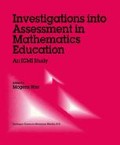Abstract
In recent years, considerable attention has been paid to improving the range and balance of activities that take place in mathematics classrooms. More emphasis is being given to the tackling of practical, extended tasks, which develop higher order skills such as the ability to formulate a question in mathematical terms, select appropriate techniques, and interpret and communicate mathematical results. These aspects are now widely recognized as important and are described in documents around the world (MSEB, 1989, 1990; NCTM, 1989; CITMS, 1982; DES, 1989; NCC, 1989).
Access this chapter
Tax calculation will be finalised at checkout
Purchases are for personal use only
Preview
Unable to display preview. Download preview PDF.
References
Assessment of Performance Unit: 1980, Mathematical Development: Secondary Survey Report, no. 1, Her Majesty’s Stationery Office, London.
Bell, A., Burkhardt, H. & Swan, M.: 1991, Balanced assessment and the Mathematics Curriculum, Shell Centre for Mathematical Education, University of Nottingham, England.
Bell, A., Shiu, C. & Horton, B.: 1981, Evaluating Attainment in Process Aspects of Mathematics, Shell Centre for Mathematical Education, University of Nottingham, England.
Brown, M.: 1989, ‘Graded Assessment and Learning Hierarchies in Mathematics — an alternative view’, British Educational Research Journal, 15 (2).
California Assessment Program: 1989, A Question of Thinking a First Look at Students’ Performance on Open-ended Questions in Mathematics, California State Department of Education, Sacramento, CA.
Committee of Inquiry into the Teaching of Mathematics in Schools: 1982, Mathematics Counts (the Cockcroft Report), Her Majesty’s Stationery Office, London.
Department of Education and Science: 1987, National Curriculum, Task Group on Assessment and Testing (TGAT) — A Report, Her Majesty’s Stationery Office,Department of Education and Science and the Welsh Office, London.
Graded Assessment in Mathematics: 1989, GAIM Development Pack, Graded Assessment in Mathematics, Macmillan, London.
Gipps, C.: 1990, Assessment. A Teacher’s Guide to the Issues. Hodder and Stoughton, London.
Mathematical Sciences Education Board: 1989, Everybody counts —a report to the nation on the future of mathematics education, (NRC Mathematical Sciences Education Board), National Academy Press, Washington, DC.
Mathematical Sciences Education Board: 1990, Assessment, A Teacher’s Guide to the Issues, Hodder and Stoughton, London.
National Curriculum Council: 1989, Mathematics: Non-Statutory Guidance York.
National Curriculum Council: 1991, Mathematics Programmes of Study, INSET for Key Stages 3 and 4 York.
National Council of Teachers of Mathematics: 1989, Curriculum and Evaluation Standards for School Mathematics, Reston, VA.
Northern Examining Association: 1990, Mathematics Through Problem Solving. A GCSE Syllabus, Manchester.
Noss, R., Goldstein, H. & Hoyles, C.: 1989, ‘Graded Assessment and Learning Hierarchies in Mathematics’, British Educational Research Journal, 15 (2).
Swan, M., Binns, B. & Gillespie, T.: 1987–89, Numeracy Through Problem Solving Five modules: Design a Board Game, Produce a Quiz Show, Plan a Trip, Be a Paper Engineer, Be a Shrewd Chooser, Shell Centre for Mathematical Education/Joint Matriculation Board, Longman, Harlow.
Swan, M., Gillespie, T. & Binns, B.: 1988, ‘The assessment of numeracy through problem solving’, in Pegg, J. (Ed.), Mathematical Interfaces — Proceedings of the Australian Association of Mathematics Teachers Conference.
Swan, M. (Ed.): 1984, Problems with Patterns and Numbers, an examination module for secondary schools, Shell Centre for Mathematical Education/Joint Matriculation Board, Manchester.
Swan, M.: 1985, The Language of Functions and Graphs, An Examination Module for Secondary Schools, Shell Centre for Mathematical Education/Joint Matriculation Board, Manchester.
Author information
Authors and Affiliations
Editor information
Editors and Affiliations
Rights and permissions
Copyright information
© 1993 Springer Science+Business Media Dordrecht
About this chapter
Cite this chapter
Swan, M. (1993). Improving the Design and Balance of Mathematical Assessment. In: Niss, M. (eds) Investigations into Assessment in Mathematics Education. New ICMI Study Series, vol 2. Springer, Dordrecht. https://doi.org/10.1007/978-94-017-1974-2_13
Download citation
DOI: https://doi.org/10.1007/978-94-017-1974-2_13
Publisher Name: Springer, Dordrecht
Print ISBN: 978-90-481-4232-3
Online ISBN: 978-94-017-1974-2
eBook Packages: Springer Book Archive

